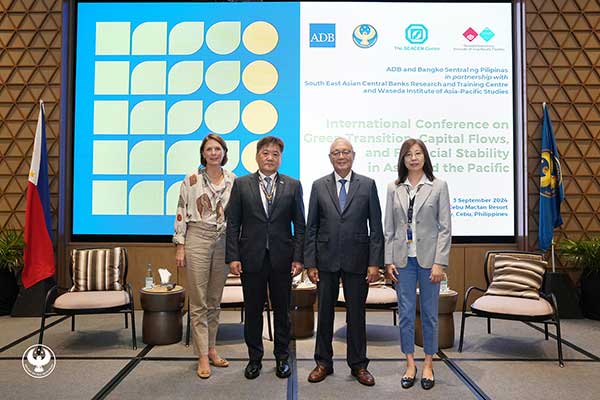
Bangko Sentral ng Pilipinas (BSP) Governor Eli M. Remolona, Jr. stressed the crucial role of central banks in managing climate risks during the “International Conference on Green Transition, Capital Flows, and Financial Stability in Asia-Pacific,” held on September 3, 2024, in Mactan, Cebu.
Remolona highlighted that central banks have the regulatory tools to tackle climate risks, viewing them as an “ultimate systemic risk.”
He noted that central banks that recognize climate risks as part of their “implied mandate” can leverage their systemic risk management tools, such as designating systemically important banks or assigning capital levels for risk exposure.
“These tools can be harnessed to push for greater climate adaptation,” Remolona said, emphasizing the importance of using existing mechanisms to confront the escalating threat of climate change to financial stability.
The conference, co-organized by the BSP, Asian Development Bank (ADB), Southeast Asian Central Banks (SEACEN) Research and Training Centre, and Waseda Institute of Asia-Pacific Studies, gathered experts to discuss pressing topics such as pricing climate risks, mobilizing private capital for low-carbon projects, and enhancing green investments in developing economies.
Capacity-Building and Private Sector Engagement
BSP Assistant Governor Lyn I. Javier emphasized the BSP’s commitment to equipping financial institutions with the necessary skills and knowledge to manage climate risks.
“This is where development partners, such as the Asian Development Bank, come in because they can bring in experts that could capacitate the industry,” Javier said, stressing the importance of capacity-building in financial institutions.
Meanwhile, BSP Assistant Governor Pia Bernadette Roman Tayag pointed to the critical need for unlocking private capital to finance sustainable projects, particularly in sectors vulnerable to climate risks.
“We need to encourage innovative financing mechanisms that allow projects to access international capital,” Tayag said, noting that this effort must be paired with developing the domestic capital market to provide alternative financing sources.
The forum’s roster of speakers included Bank of Mongolia Governor Byadran Lkhagvasuren, ADB Advisor Lotte Schou-Zibell, and several renowned economists and finance leaders from institutions such as the World Bank, the Development Academy of the Philippines, and the National University of Singapore.
Mobilizing Finance for Sustainability
The conference highlighted the need for coordinated efforts to mobilize financial resources for green initiatives, especially in emerging economies like the Philippines.
As a developing country with high vulnerability to climate change, the Philippines is pushing for climate adaptation and mitigation strategies, in which financial institutions play a pivotal role.
Citi Philippines CEO Paul A. Favila echoed this sentiment, noting that the financial sector must actively work toward sustainable development goals by directing capital to projects that promote low-carbon transitions and infrastructure resilience.
The BSP’s initiative to host the Knowledge Exchange Series on green transition aligns with its broader agenda on inclusive sustainability.
It aims to bridge knowledge gaps, foster collaboration, and drive financial stability amid climate challenges.
Key participants, including BSP officials, academia, and global financial leaders, discussed policy recommendations to ensure that central banks and financial institutions are well-equipped to support climate resilience and sustainable economic growth in the Asia-Pacific region.





















